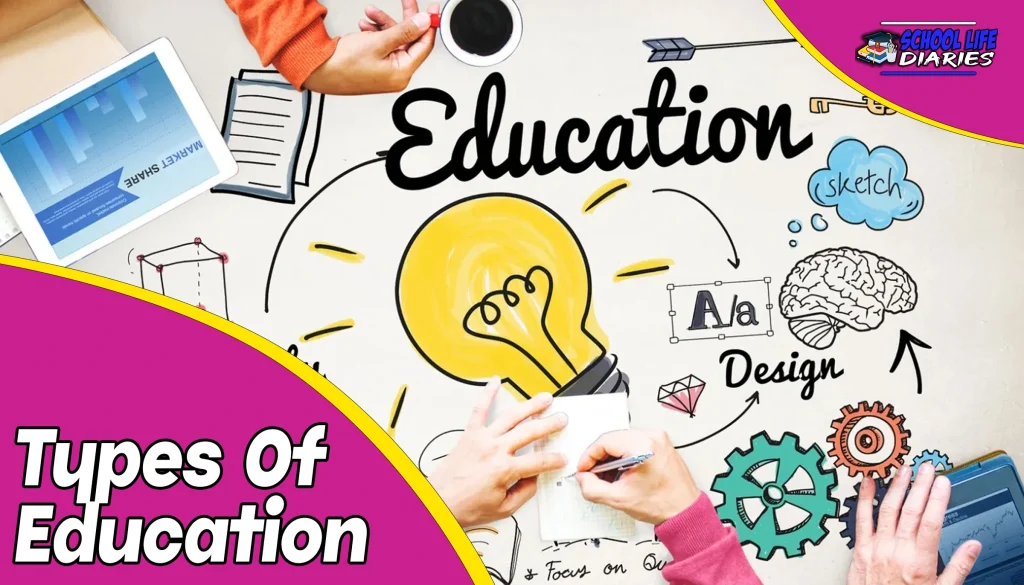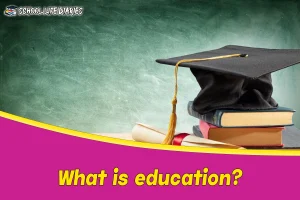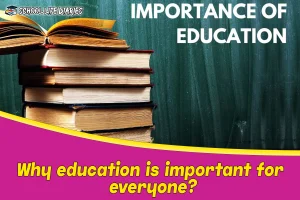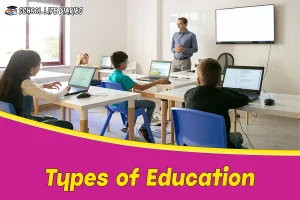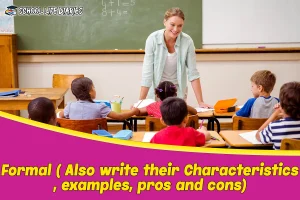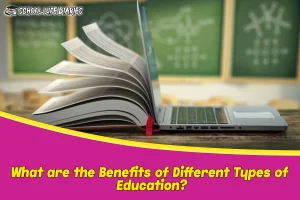Education is a fundamental aspect of human development and plays a crucial role in shaping individuals’ lives. It provides knowledge, skills, and values necessary for personal growth and societal progress. The types of education available to individuals vary widely, ranging from formal schooling to vocational training, online courses to self-directed learning.
Each type offers unique benefits and caters to different needs and goals. Education equips individuals with the tools they need to navigate the complexities of life and contribute meaningfully to society. It fosters intellectual curiosity, nurtures creativity, and promotes lifelong learning. In this article, we will explore various types of education available today and delve into the benefits they offer. By understanding the different options available, readers can make informed decisions about which type may best align with their goals and aspirations.
What is education?
Education can be defined as the process of acquiring knowledge, skills, values, and attitudes through various formal and informal methods. It is a lifelong journey that begins from childhood and continues throughout one’s life. Education plays a crucial role in shaping individuals and societies by equipping them with the necessary tools to navigate the complexities of the world.
The importance of education cannot be overstated. It empowers individuals to think critically, solve problems, and make informed decisions. Education provides individuals with a solid foundation of knowledge that allows them to understand different perspectives and engage in meaningful discussions. One of the significant advantages of education is its ability to open doors of opportunity.
A well-rounded education not only enhances employment prospects but also improves social mobility. Education equips individuals with valuable skills that are highly sought after in today’s competitive job market. Its importance lies in its ability to empower individuals intellectually and personally while providing them with opportunities for growth. The advantages of education extend beyond individual benefits by contributing to societal progress and development.
Why education is important for everyone?
The acquisition of knowledge and skills through formal schooling is essential for individuals of all backgrounds, as it empowers them to navigate the challenges of an increasingly complex world and unlocks opportunities for personal growth and societal progress.
Education plays a crucial role in shaping individuals’ lives by providing them with the necessary tools to succeed in various aspects of life. One of the key reasons why education is important for everyone is its undeniable impact on personal development. Through education, individuals gain a deeper understanding of themselves, their interests, and their abilities.
This self-awareness allows them to make informed decisions about their future career paths, enabling them to pursue fields that align with their passions and strengths. Education also offers numerous advantages that extend beyond personal development and societal contribution. Individuals with higher levels of education often have access to better job opportunities and higher earning potential.
Types of Education
Formal education refers to the structured and organized learning that takes place in schools, colleges, and universities. It follows a specific curriculum, has set goals and objectives, and is usually taught by trained teachers. Examples of formal education include attending regular school classes or pursuing higher education degrees at a university. Some advantages of formal education are that it provides a recognized qualification, enhances critical thinking skills, and prepares individuals for future careers.
Informal education occurs outside traditional educational institutions through experiences in daily life. It is spontaneous and unstructured but still contributes to an individual’s knowledge and skills. Informal education can take various forms such as learning from family members or friends, participating in community activities or workshops, or even self-learning through books or online resources. The benefits of informal education include flexibility in terms of time and content choice, practical application of knowledge gained, and the opportunity for lifelong learning. On the downside, informal education lacks formal recognition or certification.
Non-formal education is a combination of both formal and informal methods where learning takes place outside traditional classrooms but follows a planned structure with specific objectives. It aims to address specific needs for personal development or skill enhancement rather than obtaining academic qualifications. Non-formal education can be found in vocational training programs, adult literacy classes, workshops on entrepreneurship, or leadership skills development.
Formal ( Also write their Characteristics, examples, pros and cons)
Universities and colleges are widely recognized as examples of formal education institutions due to their structured curriculum, standardized assessments, and accreditation processes. Formal education refers to the traditional system of learning that takes place in a classroom setting, with teachers imparting knowledge to students through lectures, assignments, and examinations.
One characteristic of formal education is its emphasis on academic subjects such as mathematics, science, languages, and social sciences. This type of education aims to provide students with a well-rounded understanding of various disciplines. One advantage of formal education is the opportunity for students to develop critical thinking and problem-solving skills. Through rigorous coursework and challenging assignments, students are encouraged to analyze information, think independently, and come up with innovative solutions.
Examples of formal education include attending traditional schools or universities where degrees or diplomas are awarded upon completion of specific programs or courses. These institutions often follow a set curriculum approved by educational authorities and require students to pass standardized assessments before progressing further in their studies.
Informal ( Also write their Characteristics, examples, pros and cons)
Informal education, in contrast to formal education, is characterized by its flexible and non-structured nature, allowing individuals to acquire knowledge and skills outside of traditional classroom settings. Unlike formal education, which follows a set curriculum and is usually provided by educational institutions, informal education can happen in various ways such as through self-learning, social interactions, or practical experiences. This type of education emphasizes personal interests and real-life applications rather than standardized learning objectives.
One advantage of informal education is its effectiveness in fostering creativity and critical thinking skills. Since it encourages individuals to explore their own interests and pursue learning at their own pace, it provides opportunities for unique perspectives and innovative ideas to emerge.
Informal education also allows for a more holistic approach to learning as it integrates real-life experiences with theoretical knowledge. For example, a person interested in photography may learn techniques through online tutorials or by experimenting with different camera settings while capturing images in the field. By actively engaging with the subject matter in practical ways, individuals often develop a deeper understanding and mastery of the skills they are acquiring.
While informal education offers flexibility and promotes individuality in learning pursuits, it also comes with its own set of advantages and disadvantages. Its effectiveness lies in nurturing creativity and critical thinking skills but may lack formal recognition or structured guidance.
Non-formal ( Also write their Characteristics, examples, pros and cons)
Non-formal education, unlike formal education and universities, is characterized by its flexible and adaptable nature, allowing individuals to acquire knowledge and skills in a variety of settings outside traditional academic institutions. It encompasses a wide range of learning experiences that are structured but not necessarily regulated by educational authorities. Non-formal education can take place in community centers, workplaces, online platforms, and other informal environments. This type of education focuses on practical skills development rather than theoretical knowledge acquisition.
One characteristic of non-formal education is its accessibility. Unlike formal education, which often has strict admission requirements or limited enrollment capacities, non-formal education programs are generally open to anyone interested in acquiring new skills or knowledge. Additionally, non-formal education offers the flexibility to learn at one’s own pace and according to personal schedules. This allows individuals who may not have the means or time to attend formal educational institutions to still enhance their capabilities.
Non-formal education offers individuals the opportunity to acquire knowledge and skills outside of formal academic institutions. It is characterized by its flexibility, accessibility, and emphasis on practical learning experiences. While it provides numerous advantages, such as personalized learning and experiential education, it also presents challenges regarding standardization and official recognition of qualifications. Nonetheless, non-formal education plays a vital role in meeting the diverse educational needs of individuals who seek alternative avenues for personal growth and development.
What are the Benefits of Different Types of Education?
One advantage of alternative forms of education is their flexibility in adapting to individual learning needs and preferences. Unlike traditional formal education, which often follows a standardized curriculum and teaching methods, alternative forms of education allow individuals to tailor their learning experience according to their interests, abilities, and learning styles. This personalized approach can have a significant impact on personal development as it allows individuals to explore topics that genuinely interest them and learn at their own pace.
Another benefit of different types of education is the opportunity for practical application and hands-on learning. While formal education typically focuses on theoretical knowledge and academic achievement, alternative forms of education emphasize real-world experiences and practical skills.
Despite these advantages, it is important to acknowledge that each type of education has its own set of pros and cons. Alternative forms of education may lack the structured environment and rigorous assessment methods found in formal education settings. Alternative forms of education offer unique benefits compared to traditional formal education approaches. Their flexibility allows individuals to personalize their learning experience while also providing opportunities for practical application and skill development.
How Do I Choose the Right Type of Education for My Goals?
When selecting an educational pathway, individuals should carefully consider their goals and aspirations to ensure they choose the most suitable form of education. Choosing the right type of education requires a clear understanding of one’s objectives and how different educational options align with those goals. Setting specific goals can help individuals narrow down their choices and make informed decisions about their education.
Decision-making plays a crucial role in choosing the right type of education. It is important to evaluate various factors such as personal interests, career prospects, financial considerations, and learning preferences. Some individuals may prefer a more hands-on approach to learning, while others may thrive in a traditional classroom setting.
Factors like reputation, accreditation, faculty expertise, curriculum content, and opportunities for practical experience should be taken into account when making a decision. Seeking advice from professionals or mentors in the chosen field can also provide valuable insights that aid in choosing the most appropriate type of education.
Conclusion: Types Of Education
In conclusion, education plays a crucial role in shaping individuals and societies. It equips individuals with the knowledge, skills, and values necessary for personal development and success. There are various types of education available, each with its own benefits.
Formal education provides structured learning within institutions such as schools and universities. It offers opportunities for intellectual growth, social interaction, and the acquisition of qualifications that can lead to better employment prospects.
Informal education, on the other hand, occurs outside traditional educational settings and includes activities like self-learning or community-based initiatives. It allows individuals to pursue their interests at their own pace and fosters creativity and independent thinking.
Vocational education provides specialized training in specific trades or professions. This type of education is practical-oriented, preparing individuals for immediate entry into the workforce. It helps develop job-specific skills that are essential for career advancement. Finally, lifelong learning refers to continuous learning throughout one’s life beyond formal education. Lifelong learners engage in self-improvement activities like reading books or attending workshops to stay updated with new knowledge and trends.
Choosing the right type of education depends on an individual’s goals and aspirations. Formal education may be suitable for those seeking comprehensive academic knowledge or professional qualifications. Informal education can be beneficial for people interested in pursuing their passions or exploring unconventional subjects. Vocational education is ideal for those looking to acquire specific skills required by certain industries while lifelong learning suits anyone who wants to continuously grow personally and professionally.
Overall, it is important to recognize that there is no single ‘best’ type of education as each serves different purposes depending on individual circumstances and needs. A well-rounded approach that combines aspects from various types of education can provide a holistic learning experience that enriches both personal growth and professional development.

